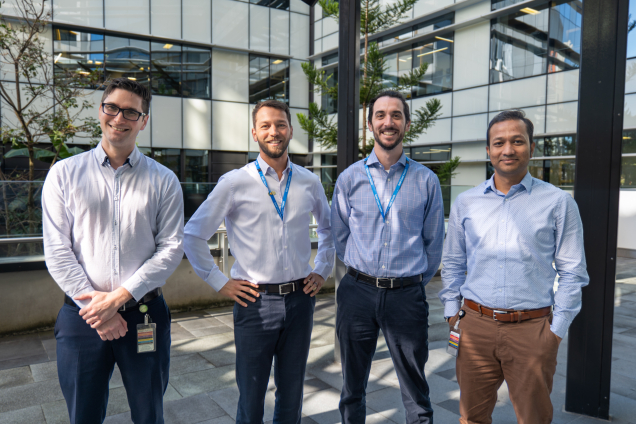
Hospitals have plenty of doctors, but what place does a Doctor of Quantum Physics have, or a Doctor of Data Science? Gold Coast Health has shown their skills are essential for a modern health service.
The expertise of academic doctors such as Ben Fox, David Evans, Jony Rabiul and Jordan Andersen, affectionately referred to as the Doctors of Data, has been vital as the health service undergoes its digital transformation.
Working together in the Data Operations team, the quartet have PhDs in varying subjects but have come together with a shared purpose at Gold Coast Health, and that is to make an impact – and they see opportunity to do that working in the public health service.
Ben, Acting Senior Director Data Operations, has a PhD focused on exercise science, David, a Principal Data Analyst, studied quantum physics, Jordan, also Principal Data Analyst, examined movement characteristics of elite swimmers, and Jony, Senior Data Analyst, looked at how to combine social media data and map data to predict and map natural disasters.
At Gold Coast Health, they’re making data more secure, easier to find, use and understand, while making processes more efficient by giving staff the data they need in real-time.
Ben says the team take on tasks across three major domains: revenue generation tasks, operational efficiency, and clinical excellence.
“If we can create a solution that reduces manual work, it can leave the clinical minds to do clinical work,” Ben explained. “We’re also picking up missed work, which leads to more accurate funding, and we’re assisting with maintaining high clinical governance standards.”
In short, Ben says, “We prefer computers to do what computers are good at and humans to do what humans are good at.”
Executive Director of Strategy, Transformation and Major Capital, Sandip Kumar, said “As a health system, we capture and maintain significant volumes of data, which leveraged in the right context can ultimately improve patient care across the entire care continuum.
“As a health service, investing in the right expertise like the ‘Data Doctors’ helps us realise this potential, and drive health system transformation we’ve set out to achieve.”
The advantages of a PhD to non-academic work are numerous. According to the Data Doctors, it fosters resilience and the confidence to defend your work, and also the strength to respond to questions and change course if the evidence doesn’t support your actions.
“Part of the candidature process is defending your work,” Ben said. “It’s not an unfamiliar experience for someone to challenge you on your work and your reasoning.
“When it comes to your PhD defence, you have to defend your ideas and your rationale and take action on relevant feedback, either responding to it or taking it on board to improve the product,” Ben said.
David added, “This team is incredibly research literate and very practiced at coming at problems from different angles, collaborating with people and valuing the knowledge of others.
“It’s great to work in a team of people with those attributes and with similar experience and passion for problem solving and investigation in the pursuit of delivering optimal outcomes.”
Meet the Doctors of Data:
Benjamin Fox, Acting Senior Director of Data Operations. Ben’s PhD focused on measuring physical function in older adults with dementia. Ben says of his PhD, “It involved data analysis and testing, and it also involved a philosophical question – what does it mean to be functionally able? “I’m inspired by the opportunity to work in the public health industry and playing my part in improving it is a strong guide for my career. I like how the focus is giving people the tools they need to do their jobs at a large economy of scale.”
David Evans, Principal Analyst. David’s PhD focused on tests of quantum entanglement. “I developed tests to help prove that the universe isn't just trying to trick us into thinking that quantum mechanics is real,” says David. He takes inspiration from quantum physics when he thinks about health service data. “Playing with the assumption that maybe the universe is doing everything possible to trick us is a useful tool that helps you identify the weaknesses and loopholes in your methods and how to close them most efficiently. You can see why we'd use similar tools here – we’re striving to build our data assets so that they work well even if everything that could go wrong does go wrong.”
Jordan Andersen, Principal Data Analyst. Jordan has a PhD in biomechanics and worked as an exercise physiologist for 14 years and recently moved into hospital administration from academia. “Because of my background and experience working as a clinician, I see a lot of the challenges and a lot of the benefits of a well-oiled healthcare system,” he said. In his most recent role before joining Gold Coast Health, Jordan was focused on using wearable devices to monitor military populations during work and training to minimise the risk of injury and reduce attrition.
Jony Rabiul, Senior Data Analyst. Jony’s PhD looked at how satellite images and social media posts can be combined to detect natural disasters. Fusing those sets of data enabled a machine to detect flooding, assess the chance of natural disasters, and create instant flood maps. “I trained a model on a single event and then tested it on different events until it was reliable, so that it was ready for instant analysis in the event of a new natural disaster,” he said.



